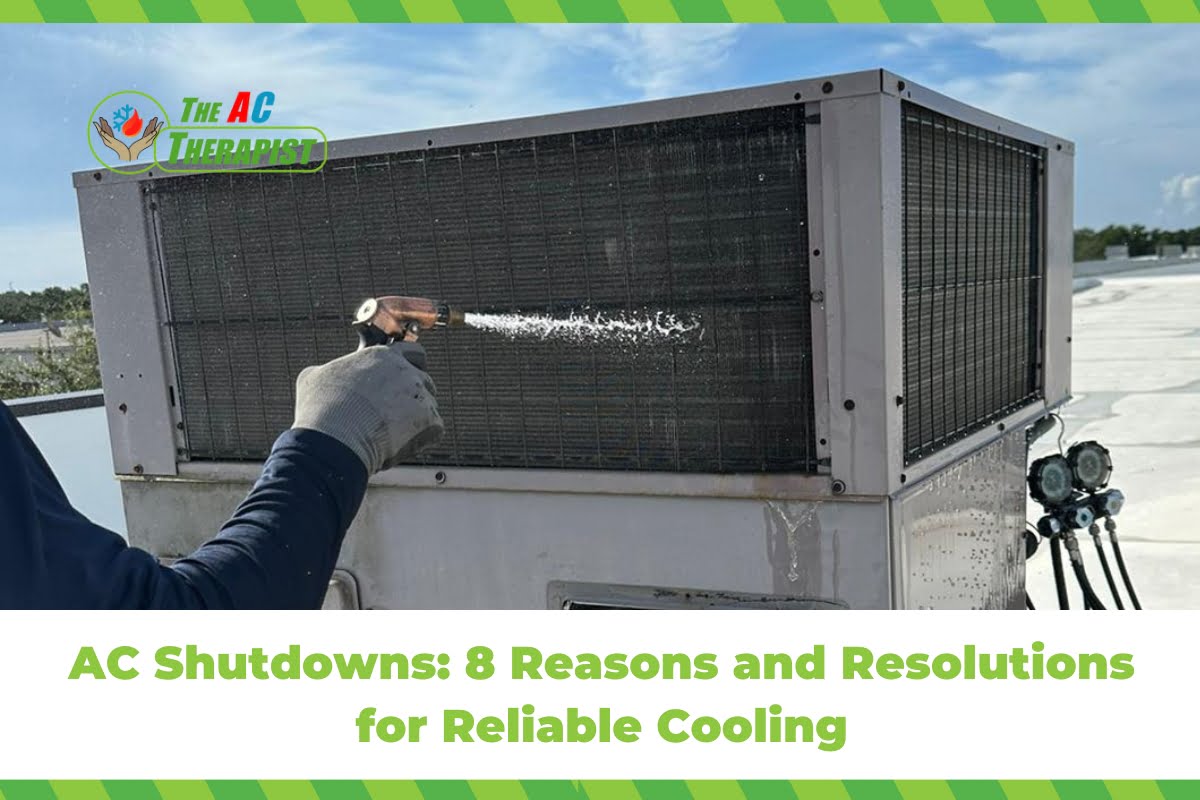AC Shutdowns: 8 Reasons and Resolutions for Reliable Cooling
Imagine a scorching summer day, and you’re seeking refuge in the cool oasis of your home, only to find that your AC keeps turning off. The frustration and discomfort can be overwhelming. AC shutdowns are not only annoying but also disruptive to your comfort. In this comprehensive guide, we’ll delve into the common reasons behind AC shutdowns and provide you with eight effective resolutions to ensure reliable cooling.
Understanding AC Shutdowns
Understanding AC shutdowns is a crucial step toward maintaining a comfortable and efficient indoor environment. AC shutdowns occur when your air conditioning system unexpectedly turns off, disrupting the cooling process and leaving you in discomfort, especially during hot summer days. To effectively address these shutdowns and prevent their recurrence, it’s essential to delve into the underlying factors and gain insights into how your AC system functions.
One of the key aspects to grasp is that AC shutdowns are not isolated incidents; they’re often symptomatic of underlying issues within your cooling system. These issues can range from minor glitches to more complex problems that require professional attention. By understanding the root causes of AC shutdowns, you can take proactive measures to prevent them, minimize wear and tear on your system, and ultimately enjoy uninterrupted cooling comfort.
A fundamental component of understanding AC shutdowns involves recognizing the various triggers that lead to these sudden halts in operation. These triggers can include thermostat discrepancies, airflow restrictions, electrical malfunctions, refrigerant imbalances, component overheating, sensor malfunctions, condensate drain problems, and compressor concerns. Each of these factors can contribute to shutdowns, and identifying the specific issue in your case is key to implementing effective solutions.
Furthermore, grasping the consequences of AC shutdowns can highlight their significance. Sudden shutdowns not only disrupt your comfort but can also lead to increased energy consumption, reduced system efficiency, and even potential damage to your AC’s components. For instance, frequent cycling due to thermostat inaccuracies can strain your AC, while component overheating can compromise the longevity of key parts. By understanding these consequences, you’re motivated to address shutdowns promptly to prevent further issues.
Educating yourself about AC shutdowns also involves recognizing when professional intervention is necessary. While some shutdowns might have simple solutions, such as clearing a clogged condensate drain, others might require the expertise of an HVAC technician.
Common Reasons for AC Shutdowns
AC shutdowns can be an unwelcome disruption, especially during hot and humid days when you rely on your air conditioning system for comfort. Understanding the common reasons behind these shutdowns is key to preventing them and ensuring uninterrupted cooling in your home.
- Thermostat Issues: A misaligned or malfunctioning thermostat can wreak havoc on your AC’s operation. If your thermostat isn’t accurately reading the temperature, it might cause your AC to turn on and off at incorrect intervals. This constant cycling not only wastes energy but also places unnecessary strain on your system’s components, potentially leading to shutdowns. Regular calibration and maintenance of your thermostat can help prevent this issue.
- Airflow Restrictions: Proper airflow is crucial for efficient AC performance. Blocked air filters, closed vents, or even obstructions around the outdoor unit can restrict the flow of air. This can lead to overheating of your AC’s components, triggering safety mechanisms that shut down the system to prevent damage. Regularly checking and cleaning air filters, ensuring vents are unobstructed, and keeping the outdoor unit clear can help maintain optimal airflow and prevent shutdowns.
- Electrical Problems: Faulty wiring, damaged components, or tripped circuit breakers can disrupt the electrical flow to your AC system, causing sudden shutdowns. These electrical issues can be dangerous and may require immediate attention from a professional technician. Regular inspections of your AC’s electrical components and addressing any problems promptly can prevent unexpected shutdowns and ensure safe operation.
- Refrigerant Imbalances: Refrigerant is the substance that cools the air in your AC system. Low refrigerant levels due to leaks can force the compressor to shut down to prevent damage. Leaks can occur over time and impact your system’s efficiency. Addressing refrigerant imbalances, fixing leaks, and ensuring proper refrigerant levels through regular maintenance can prevent shutdowns and help your AC perform optimally.
- Component Overheating: Your AC’s components, like motors and compressors, can overheat if they’re not adequately ventilated or if they’re dirty. Overheating triggers safety features that shut down the system to prevent further damage. Regular maintenance, including cleaning coils and fans, can prevent these components from overheating and causing shutdowns.
- Sensor Malfunctions: Modern AC systems rely on sensors to monitor temperature and other variables. Malfunctioning sensors can lead to inaccurate readings, causing your AC to turn on and off at inappropriate times. Regularly testing and calibrating these sensors ensures that your AC system receives accurate information, preventing premature shutdowns.
- Condensate Drain Problems: Your AC’s condensate drain removes moisture produced during the cooling process. A clogged drain can cause water to back up and trigger safety switches, shutting down the system to prevent water damage. Regular maintenance, including clearing the condensate drain, is essential to prevent this issue and avoid unexpected shutdowns.
- Compressor Concerns: The compressor is the heart of your AC system. Issues such as overheating or mechanical problems can lead to automatic shutdowns. If you notice irregular noises or vibrations, or if your AC struggles to start, it could indicate compressor problems. Promptly addressing compressor issues with the help of a professional technician can prevent further damage and ensure reliable cooling.
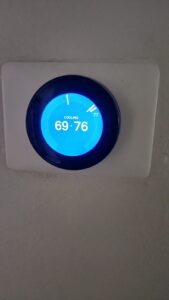
Resolutions for Reliable Cooling
- Thermostat Calibration: Regularly calibrate your thermostat and set it to accurate temperatures to prevent unnecessary cycling. The thermostat, often considered the brain of your HVAC system, holds a pivotal role in maintaining a comfortable indoor environment.
- Airflow Enhancement: Keep air filters clean and vents unobstructed to ensure proper airflow and prevent shutdowns. Undoubtedly, proper airflow is essential for efficient AC operation. It’s not just about ensuring your space cools effectively; it’s also about preventing sudden shutdowns. Keeping your air filters clean and your vents unobstructed creates a clear path for air circulation. When air filters are clogged, your AC system strains to push air through, potentially leading to system shutdowns as a protective measure. R
- Electrical Inspection: Address faulty wiring, damaged components, or tripped breakers promptly to maintain a stable electrical system. A professional HVAC technician can perform comprehensive inspections, identifying and rectifying electrical problems before they escalate. By addressing electrical issues, you not only ensure a seamless cooling experience but also mitigate safety risks associated with electrical malfunctions.
- Refrigerant Management: Monitor refrigerant levels and address leaks promptly to ensure proper AC operation. Regularly checking refrigerant levels and addressing any leaks ensures that your AC operates optimally. A well-maintained refrigerant system not only prevents shutdowns but also contributes to efficient cooling, extending the life of your AC unit.
- Overheating Prevention: Regularly clean coils and fans to prevent component overheating and ensure proper ventilation. Preventing overheating of components is another key strategy to prevent sudden AC shutdowns. Overheating can trigger safety features that shut down the system to prevent further damage.
- Sensor Maintenance: Test and calibrate sensors regularly to prevent inaccurate readings and premature shutdowns. Regular testing and calibration of sensors ensure that your AC system receives accurate information. By maintaining the accuracy of sensors, you avoid unnecessary shutdowns and ensure that your cooling system responds effectively to your comfort needs.
- Drain Clearing: Keep the condensate drain clear through regular maintenance to avoid triggering shutdowns due to blockages. Regular maintenance, including clearing the condensate drain, ensures that water can flow freely, eliminating the risk of blockages and subsequent shutdowns. Clearing the condensate drain is a simple yet impactful step in maintaining uninterrupted cooling comfort.
- Compressor Care: Address compressor issues immediately to prevent further damage and avoid automatic shutdowns. The compressor is the heart of your AC system, and its health directly impacts reliable cooling. Addressing compressor issues promptly is essential to prevent further damage and avoid automatic shutdowns. Compressor problems, such as overheating or mechanical malfunctions, can trigger protective measures that shut down the AC.
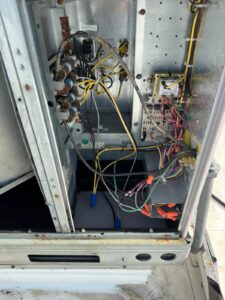
AC shutdowns can disrupt your comfort and leave you in the heat of the moment. However, armed with the knowledge of these eight common reasons and their corresponding resolutions, you can take proactive steps to ensure reliable cooling. Regular maintenance, proper care of components, and addressing issues promptly are key to preventing AC shutdowns and enjoying uninterrupted comfort throughout the hottest days of the year.
These resolutions for reliable cooling encompass a range of measures that homeowners can take to prevent AC shutdowns. By adopting these proactive strategies, you not only prevent the frustration of sudden AC shutdowns but also promote the longevity and efficiency of your AC system. Remember, a well-maintained and cared-for AC system rewards you with consistent comfort and peace of mind throughout the hottest days of the year.
A Cool Solution to a Hot Problem
When your AC keeps turning off, it can be a vexing problem that disrupts your comfort. However, armed with knowledge about the potential causes and armed with effective solutions, you can troubleshoot and resolve the issue. From thermostat adjustments to routine maintenance, each step contributes to maintaining your AC’s reliable operation. By taking proactive measures and staying vigilant, you can ensure that your AC continues to provide the refreshing cool air you need, regardless of how scorching the outside temperatures become. So, say goodbye to the frustration of AC shutdowns and hello to uninterrupted cooling comfort.
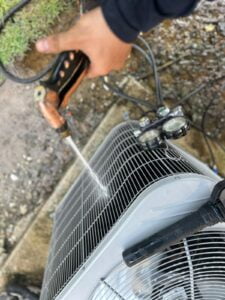
Professional HVAC Assistance: When to Seek Expert Help
While some troubleshooting can be performed by homeowners, there are instances when it’s best to seek the expertise of a professional HVAC technician. If you’re uncertain about the root cause of the problem or if the issue persists, a technician can diagnose and resolve the issue effectively.
Proactive Measures for Long-Term AC Performance
Beyond addressing immediate issues, consider implementing proactive measures to enhance your AC’s long-term performance:
1. HVAC Zoning
Consider implementing an HVAC zoning system that allows you to customize cooling zones for different areas of your home. This can optimize comfort and energy efficiency.
2. Upgrading to Smart Thermostats
Upgrade to smart thermostats that learn your preferences and adjust temperature settings accordingly. These thermostats can help prevent unnecessary cycling.
3. Duct Cleaning and Sanitation
Periodically clean and sanitize your ductwork to improve indoor air quality and prevent airflow restrictions.
4. Attic Insulation Benefits
Proper attic insulation can enhance your AC’s energy efficiency by preventing heat transfer between your home and the hot attic space.
5. Exploring Maintenance Plans
Consider enrolling in a maintenance plan offered by your HVAC contractor. These plans typically include regular check-ups and maintenance tasks, helping you prevent issues before they escalate.
Ensuring Reliable and Continuous Cooling
In regions with high temperatures, a functional air conditioning system is a necessity. Understanding why your AC keeps turning off is the first step toward regaining control over your cooling comfort. By addressing the common causes of frequent shutdowns and implementing preventive measures, you can ensure that your AC system operates reliably, providing you with the comfort you need, even on the hottest of days.
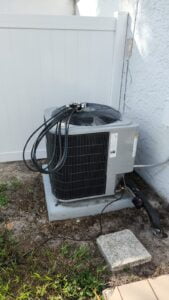
How can homeowners identify and address electrical issues?
Identifying and addressing electrical issues within your HVAC system requires a combination of observation, basic troubleshooting, and, when necessary, the expertise of a professional technician. Here’s a step-by-step guide to help homeowners identify and address electrical problems in their air conditioning system:
Identifying Electrical Issues:
- Check the Circuit Breakers: If your AC suddenly stops working, check your home’s circuit breaker panel. Look for any tripped breakers that correspond to the AC unit’s circuit. Reset the breaker if needed.
- Inspect the Thermostat: Ensure that your thermostat is functioning properly. Make sure it’s receiving power, displaying accurate readings, and responding to temperature adjustments.
- Listen for Unusual Sounds: Electrical issues can sometimes cause buzzing, humming, or clicking sounds. If you notice any unusual noises coming from your AC unit or electrical components, it might indicate a problem.
- Examine Wiring and Connections: Visually inspect the wiring and connections around your AC unit. Look for signs of frayed wires, loose connections, or burnt areas. Damaged wiring can lead to electrical problems.
- Monitor the AC’s Behavior: Pay attention to any patterns in your AC’s behavior. Does it turn on and off erratically? Does it struggle to start? These inconsistencies can point to electrical issues.
Addressing Electrical Issues:
- Power Cycle the System: If your AC has shut off unexpectedly, start by turning it off at the thermostat and then turning off the circuit breaker that powers the unit. Wait a few minutes before turning the breaker back on and restarting the AC. This simple reset can sometimes resolve minor electrical glitches.
- Check and Replace Fuses: Some AC units have fuses that protect the electrical components. If a fuse has blown, replace it with a new one of the same rating. However, if fuses are repeatedly blowing, there may be an underlying issue that requires professional attention.
- Contact a Professional: If you’re not comfortable or experienced with electrical work, it’s best to contact a professional HVAC technician. Electrical issues can be complex and potentially dangerous if not handled properly.
- Don’t DIY Complex Repairs: While there are basic troubleshooting steps homeowners can take, complex electrical repairs should be left to professionals. Tampering with intricate electrical components without expertise can lead to more significant problems or safety hazards.
- Schedule Regular Maintenance: Preventive maintenance by a licensed HVAC technician can help identify and address electrical issues before they escalate. Technicians have the knowledge and equipment to detect and fix potential problems.
- Upgrade Wiring if Necessary: If your AC unit is experiencing frequent electrical issues, it might be worth considering an upgrade to the wiring. Older wiring systems can become prone to problems due to wear and tear over time.
Empowering Uninterrupted Comfort: Navigating AC Shutdowns with The AC Therapist’s Expert Solutions
In the realm of cooling comfort, the pervasive issue of AC shutdowns can be both frustrating and disruptive. By delving into the eight common reasons and effective resolutions for these shutdowns, you’ve gained valuable insights into how to maintain a seamless and dependable cooling experience. The knowledge you’ve acquired empowers you to take proactive steps toward ensuring uninterrupted comfort.
In the pursuit of reliable cooling, The AC Therapist emerges as a reliable partner, poised to address the intricacies of AC shutdowns. Their expertise spans the spectrum of issues that can cause these shutdowns, from thermostat misalignments to electrical problems and refrigerant imbalances. By leveraging their comprehensive solutions, including thermostat calibration, electrical inspections, and compressor care, you’re not only addressing the immediate issue of AC shutdowns but also investing in the longevity of your cooling system.
The AC Therapist’s commitment to your comfort shines through as they guide you through the maze of AC shutdowns. With their assistance, you’re equipped to not only overcome these disruptions but also to maintain a consistently cool and comfortable indoor environment. The AC Therapist’s expertise ensures that you can bid farewell to the cycle of AC shutdowns, welcoming uninterrupted cooling and the peace of mind that comes with having a trusted ally in your corner.

